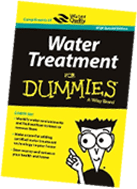Water is a fundamental element of life, as it plays a critical role in our overall health and well-being. However, water can also contain harmful contaminants that may have adverse effects on our health. That’s why many people turn to water filters as a means of purifying their drinking water and removing unwanted substances.
Water filters utilize different physical and chemical processes to filter out contaminants from water, depending on their type and quality. Here are some of the most common types of water filters and their mechanisms of action:
Mechanical Filters:
Mechanical filters employ a physical barrier, such as a mesh, ceramic, or fiber, to trap particles and sediments in the water. These filters are commonly used as pre-filters to protect other filters from clogging. They are rated based on their micron rating, which indicates the size of the pores in the filter and the smallest particles they can remove. For instance, a 0.5-micron filter can effectively remove cysts, while a 5-micron filter can eliminate sand and rust.
Activated Carbon Filters:
Activated carbon filters use a process called adsorption to remove contaminants from water. Adsorption refers to the molecular attraction and adherence of substances to the surface of a solid material. Activated carbon, which is a highly porous material with a large surface area, can attract and hold organic compounds, such as chlorine, pesticides, herbicides, volatile organic compounds (VOCs), and unpleasant tastes and odors. Additionally, activated carbon filters can also reduce some metals, including lead and mercury, from water.
Reverse Osmosis Filters:
Reverse osmosis filters utilize a semi-permeable membrane to remove dissolved solids, such as salts, minerals, metals, nitrates, fluoride, and microorganisms, from water. The process of reverse osmosis involves applying pressure to force water through the membrane, leaving behind the contaminants. Reverse osmosis filters typically consist of multiple stages, including a mechanical filter, an activated carbon filter, and a storage tank.
Ion Exchange Filters:
Ion exchange filters use resin beads to exchange ions in water. Ions are atoms or molecules that possess an electric charge. These filters can soften hard water by replacing calcium and magnesium ions with sodium or potassium ions. This can also reduce nitrate, arsenic, radium, and some metals from water by replacing them with harmless ions.
Distillation Filters:
Distillation filters utilize heat to vaporize water and leave behind contaminants. The process involves boiling water and collecting the steam in a condenser. As the steam cools down, it condenses into liquid water again, free from contaminants.
Distillation filters are effective at removing most dissolved solids, metals, microorganisms, and some chemicals from water. However, it’s important to note that they may also remove beneficial minerals and alter the taste of water.
For over three decades, Kinetico Water Systems has been a reputable source of reliable water filtration in Fort Myers, FL. Their advanced reverse osmosis technology effectively eliminates impurities such as arsenic and chlorine, ensuring pure and refreshing drinking water. With easy maintenance and a space-saving design, Kinetico systems offer convenience and practicality. Moreover, their eco-friendly approach promotes water conservation and waste reduction.
Upgrade to Kinetico water filtration in Fort Myers home and enjoy pristine drinking water!





